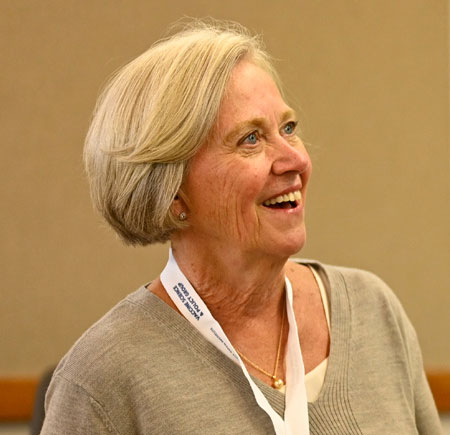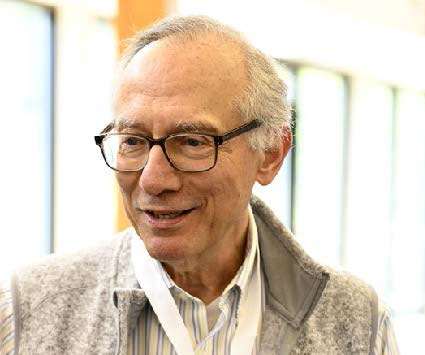
Shirley M. Tilghman
Co-Chair

Harvey V. Fineberg, M.D., Ph.D.
Co-Chair
Nothing in recent memory has underscored the urgency of a strong vaccine enterprise more than COVID-19, the coronavirus that struck with such force in early 2020. While development of an effective vaccine to control the resulting pandemic is likely at least a year away, the danger of infectious diseases has been made shockingly real across the globe, and the gift of effective immunization has once again become apparent.
Yet COVID-19 arrived at a time when hesitancy about long-established vaccines has become a real and present danger. Although vaccination remains a well-accepted social norm worldwide, a combination of factors—including misinformation spread on social media; decreased trust in institutions including government, science, and industry; and weaknesses within health systems—has emerged to diminish confidence among some populations.
As co-chairs of the Sabin-Aspen Vaccine Science & Policy Group (the Group), we recognize a profound responsibility to bring forward an innovative plan to strengthen vaccine acceptance and tame the risk of hesitancy. In September 2019, the 22 highly distinguished members of the Group gathered for their second annual meeting at the Aspen Institute’s campus in Aspen, Colorado, where they spent 2-1/2 days exploring this issue. We are truly grateful to this able team of leaders, who represent both domestic and global perspectives and bring professional experience across a wide range of disciplines to our convening. They have been exceptionally generous with their time and talent.
Their vigorous discussions, informed by background research papers and expert presentations, generated three “big ideas” for addressing vaccine hesitancy and promoting the critical importance of timely immunization. These ideas—as well as the principal findings that support them and an evidence-based review of the challenges to vaccine acceptance—are presented in the Group’s consensus paper that opens this compendium, Getting Back on Track: Restoring Vaccine Confidence and Confirming Vaccination as a Social Norm.
The commissioned papers included here are frank in exploring the potential barriers to vaccine acceptance and bold in the solutions they identify:
- The Challenge of Vaccination Hesitancy and Acceptance: An Overview, by Arthur Allen and Robb Butler
- What Do We Know About Movement Emergence and Success? by Doug McAdam
- What Works to Increase Vaccination Uptake, by Noel T. Brewer
- The Complex Contagion of Doubt in the Anti-Vaccine Movement, by Damon Centola
- Online Misinformation about Vaccines, by Renée DiResta and Claire Wardle
This body of work clarifies many of the reasons for vaccine hesitancy, including the tempting retreat to the perceived safety of inaction; considers how social movements emerge and succeed and how to build such a movement to broaden vaccine acceptance; and examines the value of activities that foster behavior change to drive vaccine use.
This body of work clarifies many of the reasons for vaccine hesitancy, including the tempting retreat to the perceived safety of inaction.
The three big ideas that emerged from the Group’s dialogue are to: create a new collaborative partnership between the vaccination community and social media platforms; develop a prioritized research agenda to generate much needed knowledge about sources of vaccine hesitancy and the evidence to inform the most effective mechanisms to counter it; and craft a strategy to shift the conversation around immunization to one that focuses on its many benefits. Together, these ideas address the primary barriers to vaccine acceptance and provide a framework for progress.
Our work does not end with the publication of this report. We are committed to sharing these big ideas through the rich networks of the Group, the Sabin Vaccine Institute, the Aspen Institute, and our many partners, and advocating for strategies that will turn them into action. Through these efforts, the Sabin Institute carries on the legacy of Albert B. Sabin, M.D., whose oral polio vaccine helped drive polio to the brink of extinction. We build, too, on the Aspen Institute’s Health, Medicine and Society Program’s stellar tradition of advancing changes that can improve the health of individuals, families, communities, the nation, and the world.
Along with our dedicated members, we are especially grateful to our funder, the Bill & Melinda Gates Foundation, which understood the urgency of combatting vaccine hesitancy and gave us the support so essential to doing so. The teams at Sabin and at the Health, Medicine, and Society Program are deeply committed to this initiative, and offer leadership, insight, and attention to detail.
Together, we can overcome the risks posed by vaccine hesitancy and ensure continued and widening support for one of the most powerful tools ever developed to protect public health.

Harvey V. Fineberg, M.D., Ph.D.
Co-Chair

Shirley M. Tilghman
Co-Chair
